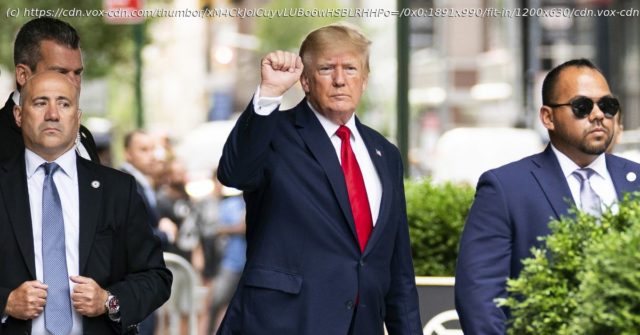A nuclear weapons historian explains why it’s so hard to know what material Trump took from the White House.
The reported Thursday that “classified documents relating to nuclear weapons” were among the things FBI agents were looking for when they searched Mar-a-Lago this week. And there were numerous examples of “secret,” “confidential,” and “top secret” documents listed on the official property receipt from the seizure that was released Friday.
A warrant released alongside the receipt suggested the FBI may be looking into violations of the Espionage Act and potential obstruction of justice as well.
Former President Donald Trump has denied taking any nuclear-related documents, calling the Post’s reporting a “Hoax.” Trump has been known to issue false and misleading statements before, of course, which raises the question: If Trump had nuclear secrets lying around his house, what might they be?
“It could be anything ranging from something that would endanger the lives of hundreds of millions of people to something that has no impact on anything whatsoever. That’s how vague the classified categorization is,” Alex Wellerstein, a historian of science and nuclear weapons, told me.
I reached out to Wellerstein after the Post report, and after the New York Times reported that federal investigators were concerned about information from “special access programs” — what the Times called “extremely sensitive” US operations abroad, or sensitive technology or capabilities — falling into the wrong hands if it was being stored at Mar–a-Lago. In his research, Wellerstein has focused extensively on the history of nuclear weapons, presidential power over them, and how nuclear secrets are safeguarded.
I asked Wellerstein to offer some ways to think about all this news, and whether Trump could be in legal trouble. Our conversation, below, has been edited for clarity.
How should we understand what’s going on here?
There’s two frameworks that I keep coming back to. One, is there a national security risk to how these documents were handled or stored? [Was there any] breaking the law or breaking regulations?
Separate from the question of whether Trump could be prosecuted — that’s a harder question to answer in some ways, because the president can declassify certain categories of things, sort of by fiat — is there a risk in keeping these kinds of documents at Mar-a-Lago?
Mar-a-Lago is potentially not set up to handle these kinds of documents according to the regulations. If you have a top secret document, that implies, through these regulations, how you can handle this document, what kind of safe it can be in, who is allowed to be guarding the safe, what they have to be armed with. All of that kind of stuff.
Then there’s the perhaps more significant legal angle which is, what are the responsibilities of the White House with the preservation and disposition of records, which is a totally separate issue. It’s pretty clear you’re not allowed to take records home and keep them and not give them to the National Archives and not give them to your successors. There are pretty tight regulations around what you are allowed to do with these kinds of records.
Does that legal framework apply to nuclear secrets?
Nuclear is tricky, because nuclear secrets are handled by a different law [the Atomic Energy Act] than the rest of [government] secrets, and the president’s ability to sort of arbitrarily declassify things in a nuclear realm is not as obvious. The law constricts nuclear secrets very differently than it constricts most national security information. It’s hard to know whether it could either be something incredibly banal and not interesting, or something that would have massive implications for American security and diplomacy. And so it’s the entire gamut of extremes.
What about the term “special access program”? Does that suggest something significant?
Usually when you have something like a special access program, what you’re essentially saying is, we have lots of secrets that we think, if they got released, would do damage to the United States.






